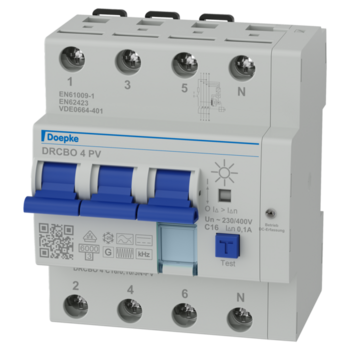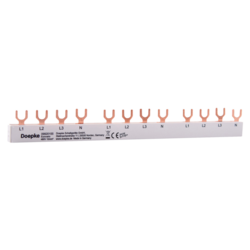residual current operated circuit-breakers with integral overcurrent protection DRCBO 4 C16/0,10/3N-PV
- AC-DC sensitive for increased fire prevention
- higher system availability: photovoltaic optimised short-time delay
- clear labelling of the scope of application


residual current operated circuit-breakers with integral overcurrent protection DRCBO 4 C16/0,10/3N-PV
- AC-DC sensitive for increased fire prevention
- higher system availability: photovoltaic optimised short-time delay
- clear labelling of the scope of application
Details
Residual current operated circuit-breaker with integral overcurrent protection, three-pole+N, 16 A, 0,1 A, 6 kA, C-characteristic, for PV installations
RCBOs combine residual current protection and overcurrent protection in a single device. This makes them ideal for use in distribution boards where space is limited. The rated breaking capacity of the DRCBO 4 series is 6 kA. These current circuit-breakers are AC-DC sensitive and provide VDE fire protection requirements for frequencies up to 20 kHz. Our PV RCBOs were specifically developed for use in photovoltaic systems and offer the highest level of protection. Thanks to a PV-optimised short-time delay, the RCBOs are particularly resistant to surge currents. This reduces nuisance tripping and increases your system’s availability. With tripping characteristic C, these circuit-breakers ensure reliable protection for your circuits with loads that generate higher inrush peaks. Standard circuit-breakers are designed for circuits with 230 V or 400 V at 50 Hz.
AC/DC sensitive for residual currents with frequencies of 0 Hz (smooth direct current) up to 20,000 Hz, mains-voltage-independent tripping when type A residual currents occur, compact design for all rated currents, switch position indicator, separate indication of tripping cause, strain-relief clamps with a wide terminal cross-section range on both connection sides, neutral conductor right, labelling area
quick fastening to mounting rail, any installation position, supply preferably from above
RCBOs of the PV variant are suitable for private, commercial and industrial installations with TN-S, TT and TN-C-S systems in which photovoltaic systems are installed.
suitable for use in 50 Hz AC networks, not suitable for use on the output side of controlled electrical equipment such as frequency converters
- Data sheet DRCBO 4 C16/0,10/3N-PV
- Operating instructions
- Text for invitation to tender RTF
- Text for invitation to tender GAEB XML
- Text for invitation to tender GAEB 2000
- Text for invitation to tender GAEB 90
- Dimensional drawing Group view
- STEP file
- Wiring diagram
- Product video Residual current protection for photovoltaic systems
- Download link Cadenas library
Residual current operated circuit-breaker with integral overcurrent protection, three-pole+N, 16 A, 0,1 A, 6 kA, C-characteristic, for PV installations
RCBOs combine residual current protection and overcurrent protection in a single device. This makes them ideal for use in distribution boards where space is limited. The rated breaking capacity of the DRCBO 4 series is 6 kA. These current circuit-breakers are AC-DC sensitive and provide VDE fire protection requirements for frequencies up to 20 kHz. Our PV RCBOs were specifically developed for use in photovoltaic systems and offer the highest level of protection. Thanks to a PV-optimised short-time delay, the RCBOs are particularly resistant to surge currents. This reduces nuisance tripping and increases your system’s availability. With tripping characteristic C, these circuit-breakers ensure reliable protection for your circuits with loads that generate higher inrush peaks. Standard circuit-breakers are designed for circuits with 230 V or 400 V at 50 Hz.
AC/DC sensitive for residual currents with frequencies of 0 Hz (smooth direct current) up to 20,000 Hz, mains-voltage-independent tripping when type A residual currents occur, compact design for all rated currents, switch position indicator, separate indication of tripping cause, strain-relief clamps with a wide terminal cross-section range on both connection sides, neutral conductor right, labelling area
quick fastening to mounting rail, any installation position, supply preferably from above
RCBOs of the PV variant are suitable for private, commercial and industrial installations with TN-S, TT and TN-C-S systems in which photovoltaic systems are installed.
suitable for use in 50 Hz AC networks, not suitable for use on the output side of controlled electrical equipment such as frequency converters
- Data sheet DRCBO 4 C16/0,10/3N-PV
- Operating instructions
- Text for invitation to tender RTF
- Text for invitation to tender GAEB XML
- Text for invitation to tender GAEB 2000
- Text for invitation to tender GAEB 90
- Dimensional drawing Group view
- STEP file
- Wiring diagram
- Product video Residual current protection for photovoltaic systems
- Download link Cadenas library


